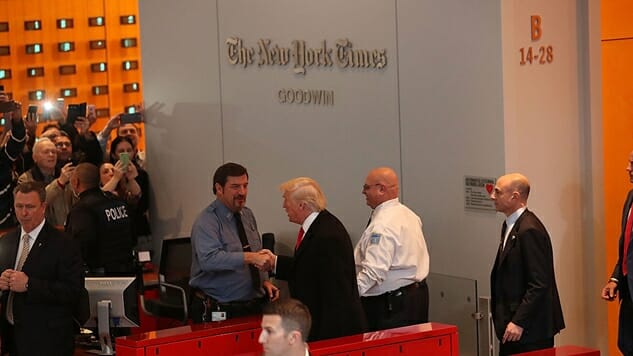The New York Times Is Concerned That Their Journalists Are Too Biased against Trump on Social Media
Photo by Spencer Platt/Getty
The New York Times White House correspondent, Glenn Thrush, abruptly quit Twitter about a month ago—saying it had become a distraction.
This account is dormant as of 9/19/17.
— Glenn Thrush (@GlennThrush) September 19, 2017
This seemed to set a chain of events in motion that lead to NYT executive editor Dean Baquet to declare that the Times is “going to come up with a tougher [social media] policy.” He brought up a good point: that he cannot accomplish the paper’s goal of being “journalistically sound” on the topic of our fake news loving president if “I have 100 people working for the New York Times sending inappropriate tweets.” Baquet is concerned about his journalists looking like they have a “vendetta” against Trump, but by raising this concern, it comes off like he’s acknowledging that they already are biased.
By saying that he is concerned about appearing to play favorites on social media, Dean Baquet essentially said that his reporters are biased against Trump, and he just wants to hide that fact from the public, or worse—embed that bias into the Times. One glance at conservative Twitter this morning demonstrates that this is how Baquet’s words are being interpreted.
If NYT doesn’t have a ‘vendetta’, then why does the editor have to police tweets? https://t.co/vTZldNkpio
— Stephen Miller (@redsteeze) October 13, 2017
Baquet has yet to elaborate on the details of the new policy, but he laid out the basics: Times reporters “should not be able to say anything on social media that they cannot say” in the paper. This is a nice thought in theory—but once you hold it up to reality, it begins to crumble. The Times has a litany of editors, copy editors (well, not so much anymore), and various other eyeballs looking over stories before they appear on any of their properties. If they’re not going to install the same vetting process for tweets (and how could they?), how are they going to enforce this standard?
Reporting on President Trump is a delicate balance for people who work at major institutions like the New York Times or Washington Post. He is doing empirically bad things, and saying that his policies will damage the country does not mean it is a biased take. This is one of the central problems with the media in this country: that many executives believe a reporter’s job is to “play it down the middle” instead of searching for the truth. But this is far easier said than done. For example, how do you treat Trump’s words and actions on Puerto Rico as if they aren’t irresponsible? It’s something that most us believe.
US Voter GRAPH – Trump administration’s handling of hurricane affected #Texas, #Florida#PuertoRicohttps://t.co/hx1A4OCQVepic.twitter.com/NmcLUZMJfo
— Quinnipiac Poll (@QuinnipiacPoll) October 12, 2017
The New York Times seems to care more about people who don’t buy subscriptions to the paper than those who do. Hiring a climate change denier like Bret Stephens to their op-ed page, and giving space to Blackwater’s Erik Prince to push his new mercenary idea is proof that the Times is serious about the specious “down the middle” coverage that is more about ensuring advertisers are happy than reporting the news. Their new social media policy follows this same line of thinking, where appearing biased towards anyone is the chief motivating factor to regulate someone’s behavior—and not the facts on the ground. The Times is struggling with its role in the Trump Era, and the rollout of this vague policy suggests that they are nowhere near a resolution.
Jacob Weindling is a staff writer for Paste politics. Follow him on Twitter at @Jakeweindling.







































